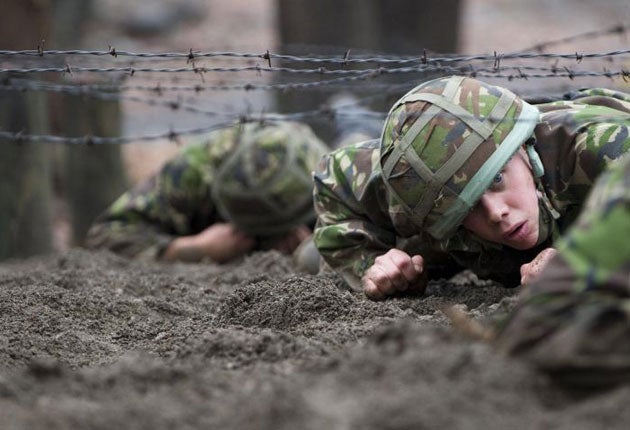Last Night's TV - Sandhurst, BBC4; Jono: Finding My Family on Facebook, BBC3
When soldiers aren't tailor-made for war

Your support helps us to tell the story
From reproductive rights to climate change to Big Tech, The Independent is on the ground when the story is developing. Whether it's investigating the financials of Elon Musk's pro-Trump PAC or producing our latest documentary, 'The A Word', which shines a light on the American women fighting for reproductive rights, we know how important it is to parse out the facts from the messaging.
At such a critical moment in US history, we need reporters on the ground. Your donation allows us to keep sending journalists to speak to both sides of the story.
The Independent is trusted by Americans across the entire political spectrum. And unlike many other quality news outlets, we choose not to lock Americans out of our reporting and analysis with paywalls. We believe quality journalism should be available to everyone, paid for by those who can afford it.
Your support makes all the difference.I don't suppose the Taliban watch a lot of television, given the difficulties of getting a reliable signal and the dim view they take of this satanic medium. But I take it that someone out there must be sending them DVDs of the slew of Army documentaries that we've recently seen on screen, from BBC's Our War, Young Soldiers and The Bomb Squad to Channel 4's Fighting on the Front Line. And if there is a Taliban equivalent of staff training college they'll presumably be taking a fairly close interest in Sandhurst, which is devoted to the next generation of young officers who will have the job of going out to Afghanistan to try and kill their graduates. If they ever get round to watching last night's episode, they will encounter a strangely recursive scene: a young trainee officer watching a YouTube glorification of insurgent snipers at work in Iraq. "You don't see us filming down our telescopes picking off the Taliban," the young man said disapprovingly, "but that's just the way they fight, isn't it?" Of course, as anyone who saw Fighting on the Front Line the other night will know, we do film exactly such moments – and broadcast them too.
What may puzzle the Taliban intelligence officers, though, is the odd combination of aggression and sensitivity that runs through the Sandhurst training. We have what they might recognise as mullahs – army chaplains who tutor the trainee officers in the theology of justified killing – and we even have something that they might identify as a pale (and far more thoughtful) equivalent to their own cult of martyrdom. The soldiers here were taken on a trip to a military cemetery to impress upon them just how terminally demanding their career choice can be, and they were also encouraged to read the combat diaries of an exemplary young officer who had been killed just four weeks into his first tour in Afghanistan. There are also elements of training designed to replace humane instinct with a more brutal reflex. In bayonet training, a phalanx of young trainees chanted "kill, kill, kill" as a colour-sergeant screamed his dismay at their lack of obvious blood-lust.
But a Taliban observer would surely have been baffled by the freedom of thought extended to the recruits. "There's something very stupid about patriotism," said one female student. "Something very blind... you have to find a better reason than that to join the Army." In her case it was a defence of liberal values. And another recruit's eventual decision that he couldn't commit himself to killing in action was treated with surprising forbearance by his senior officers. Some of that restraint was presumably to do with the presence of cameras, but it also seems integral to the training, which bends over backwards to make it clear to the candidates what they're letting themselves in for. What the Taliban would make of Sandhurst's colour-sergeants, I have no idea at all, but their relish for inflicting pain on students who notionally out-rank them is both impressive and bizarre. One recruit made the mistake of leaving his curtains slightly drawn and was ordered to climb back into his bed while he was given a 110-decibel bollocking. "Stand to attention while you're in bed!" shrieked his tormentor, suddenly noticing that his victim was looking a little too relaxed. Another student, determined not to let a single wrinkle live, was seen ironing his bed before morning inspection. I don't suppose the Taliban strategists are going to say, "This is terrifying – they're light years ahead of us when it comes to hospital corners." But it might give them pause to learn that the people they're up against actually have a choice about whether they go through this.
In Jono: Finding My Family on Facebook, Jono Lancaster, who has Treacher-Collins syndrome, explored the odd twist that social media have added to the business of reuniting divided families, by making it far easier for adopted children to seek out blood relatives. His own birth parents don't want any contact with him – one assumes because they're thoroughly ashamed of themselves, rather than because they're ashamed of him. And if it is the latter, then they're idiots, because Jono is almost painfully selfless about their dereliction. He longs to make contact with his siblings, who he can see on Facebook, but won't spring it on them in the teeth of his parents' opposition. I suppose he has to believe that their feelings are worth sparing because the alternative conclusion – that they don't really have finer feelings at all – would be worse. Perhaps one day they'll show as much courage as he already has.
Join our commenting forum
Join thought-provoking conversations, follow other Independent readers and see their replies
Comments